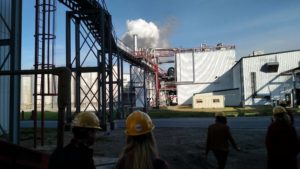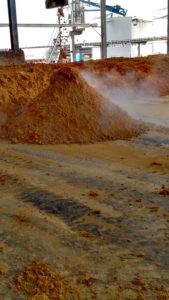Cornhusker NAMA Tours Ethanol Plant
Members of the Cornhusker Chapter of NAMA ventured to Shenandoah, Iowa, on Oct. 27 for a tour of the first of 17 ethanol processing plants owned and operated by Green Plains. Based in Omaha, Nebraska, Green Plains is a vertically integrated ethanol producer with current ethanol production capacity of approximately 1.5 billion gallons per year from plants strategically located across the U.S. The Shenandoah plant alone takes in more than 70,000 bushels and processes approximately 210,000 gallons of ethanol daily.
During the tour, Cornhusker NAMA members learned about the science of ethanol production, including several important co-products of the process including distillers grains and corn oil. At capacity, Green Plains ethanol plants will produce approximately 4.1 million tons of distillers grains annually that will be used as a high-protein, high-energy animal fodder and feed supplement. Corn oil is also a co-product of ethanol production that is sold to biodiesel manufacturers and to feed lot and poultry markets.
“We had all driven by ethanol production facilities before but few of us had actually toured a plant,” says Randy Happel, Cornhusker Chapter president-elect. “The processing science is fascinating. We were also impressed to learn more about the important co-products derived from the process. The facility is fully automated and we were impressed with the efficiency and operational technology. We left with a great appreciation for the important role ethanol production plays in the U.S. ag economy, especially for corn growers.”
Looking ahead to next generation technology, Green Plains formed a joint venture to commercialize algae production technology called BioProcess Algae. Using Green Plains advanced Grower Harvester™ technology, BioProcess Algae is currently producing algae with its commercial scale bioreactors. The algae grown and harvested from these reactors have the potential to be used for advanced biofuel production, high quality animal feed, nutraceuticals and pharmaceuticals and as biomass for energy production.

Cornhusker NAMA members journeyed to neighboring Iowa for an informative guided tour of the Green Plains ethanol production facility. Located in Shenandoah, Iowa, and the first of 17 Green Plains facilities located throughout the country, the plant takes in more than 70,000 bu. of corn daily; producing upwards of 210,000 gallons of ethanol.

No comments.
No comments are allowed on this page.